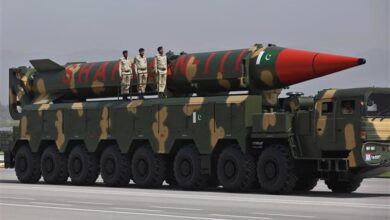US conducts third attack against Houthis in Yemen after missile strikes a ship in the Red Sea
Red Sea crisis: After an assault on a Greek-owned vessel in the Red Sea by an Iran-backed group, the United States conducted its third strike against the Houthi rebels in Yemen on Tuesday by targeting anti-ship missiles in a region under Houthi control. There were 24 crew members on board the Greek-owned Zografia, which was traveling from Vietnam to Israel when it was assaulted, according to accounts. The ship was empty of goods.

According to the White House, further US attacks on Tuesday destroyed ballistic missiles that the Houthis were prepared to fire. “We have no plans to grow this. White House spokesman John Kirby said, “The Houthis have a choice to make and they still have time to make the right choice, which is to stop these reckless attacks.”
Since November, the Houthis’ attacks on nearby ships have disrupted international commerce and frightened powerful nations. The Houthi organization, which is affiliated with Iran, has threatened to include US ships in its assaults in the Red Sea. The group claims that its actions are a reaction to Israel bombarding Gaza. The threats come in response to American and British raids on its locations in Yemen.
Despite the major US and British assault on the group on Friday, which included striking more than 60 targets in 28 places, the current exchange of missile assaults implies there has been no respite in Houthi attacks on ships in the vicinity. For some weeks now, Western nations have urged the Houthis to stop their assaults and adhere to international law.
Not joining the US attacks in Yemen was France.
According to French President Emmanuel Macron, his nation chose not to support US operations against the Houthis in order to prevent tensions in the Middle East from rising. He said that the French Navy has intercepted many missiles and drones aimed at commercial boats in recent weeks, and that French warships in the area would continue to support the defense of trade lanes and freedom of navigation.
“France made the decision to leave a coalition that conducted preemptive attacks on other countries’ territory. Why? Considering that our stance is to prevent any escalation. At a press conference, he said, “It’s a diplomatic issue because we are vigilant and attentive about balance in the region.”
Macron urged a truce in Gaza and emphasized France’s efforts to resolve the disputes in the area, including an extraordinary agreement reached with Qatar to provide medication to Hamas prisoners on Wednesday. He said that four French citizens are being taken hostage in Gaza and that 41 French civilians were murdered in Hamas’ October 7 assault on Israel.
growing hostilities in the Middle East
The Houthis attacked a US-owned ship on Monday close to Yemen’s coast in the Gulf of Aden, which prompted the US and Houthi strikes. The Houthis had never before successfully attacked a ship owned or controlled by the United States, before their assault on the MV Gibraltar Eagle. The bulk ship, owned and managed by US-based Eagle Bulk and flying the Marshall Islands flag, escaped serious damage, according to the US Central Command.
After weeks of attacks on ships in the Red Sea, the rebels headquartered in Yemen promised vengeance for an attack by the United States and its allies. This further raised fears about the potential expansion of the Israel-Hamas conflict. Due to the Israel-Hamas conflict, the Houthis have launched operations that might escalate the fighting into a regional battle, focusing on the vital route that connects oil and freight supplies from Asia and the Middle East to the Suez Canal and ultimately to Europe. At least fifteen tankers changed their path on Monday in reaction to the growing dispute, according to ship-tracking data.
International shipping has also been hampered by the assaults, leading some corporations to abandon transits via the Red Sea in favor of the more expensive and time-consuming route across Africa. Although the Houthis claim that their strikes are meant to put a halt to the Israeli air and military assault that is hammering the Gaza Strip, the connections between the rebel assaults and the ships that are being targeted are becoming more shaky.
The Suez Canal Authority of Egypt, however, downplayed any inconvenience, stating in a statement that traffic via the canal was “going as per normal” and that the suspension of company passage over the canal was “temporary”. This followed the indefinite suspension of all exports across the Red Sea by British oil firm Shell, and the Russian tanker group Sovcomflot’s consideration of other options to resolve the problem.
Yemen’s vice president said on Tuesday that Saudi Arabia, the United Arab Emirates, and Egypt—regional powers—have not joined the US-led coalition that is now in place to protect commercial activity in the Red Sea, making it weak. Referring to the strait at the southern entrance to the Red Sea, “this Bab al-Mandab corridor is of interest to the whole world and to the region, so regional intervention is key,” Aidarous al-Zubaidi said in an interview with Reuters.







